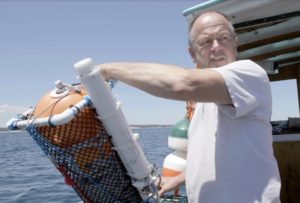 YARMOUTH PORT – The population of North Atlantic right whales continues to fall and the International Fund for Animal Welfare is trying to help by conducting a pilot study of lineless lobster gear.
YARMOUTH PORT – The population of North Atlantic right whales continues to fall and the International Fund for Animal Welfare is trying to help by conducting a pilot study of lineless lobster gear.
Earlier in the summer, IFAW funded a study and teamed with the Massachusetts Lobstermen’s Association to test an acoustic release lobster trap system which includes submerged line that can be released to the surface by fishermen.
Fishing line entanglements are one of the two most common causes of right whale deaths, along with ship strikes.
“We are moving towards this concept of buoyless of vertical lineless gear,” said C.T. Harry, an IFAW biologist.
Harry said the study has been a success because it is getting more fishermen to try the new gear.
“It didn’t work 100 percent of the time but it didn’t fail 100 percent of the time,” Harry said. “So we think there is promise but it’s a long road and we are right there at this critical initial phase.”
The gear that was tested is used for commercial fishing off Austrailia.
“It is used frequently with very good success as far as actually facilitating a catch of the desired target species,” Harry said.
Harry said getting systems like these to more fishermen is the next step so that they can provide feedback to manufacturers on how to improve the technology.
“I think getting the gear in the hands of fishermen and allowing them to kind of troubleshoot it and inform us and also the developer what works, what doesn’t and how to improve it down the way is a really important step,” Harry said. “It’s the industry partnership and feedback that we think is going to really drive this process.”
The critically endangered North Atlantic right whale population is estimated to be around 430.
The last few years have been extremely hard on the species. In 2017, at least 17 of the whales were found dead – most of them in Canadian waters.
So far this year there have been two confirmed right whale deaths. One of the carcasses was found off the coast of Martha’s Vineyard on August 27. The death was most likely caused by an entanglement which led to the animal drowning, according to IFAW officials who conducted a necropsy.
The male whale was estimated to be about 18 months old.
It was likely one of just five calves born during the 2016-2017 birthing season.
The diminishing birth rates are a major concern for the species.
Only about 100 breeding age females remain and more females seem to be dying than males.
There was no evidence of any calves born this season among the species.























